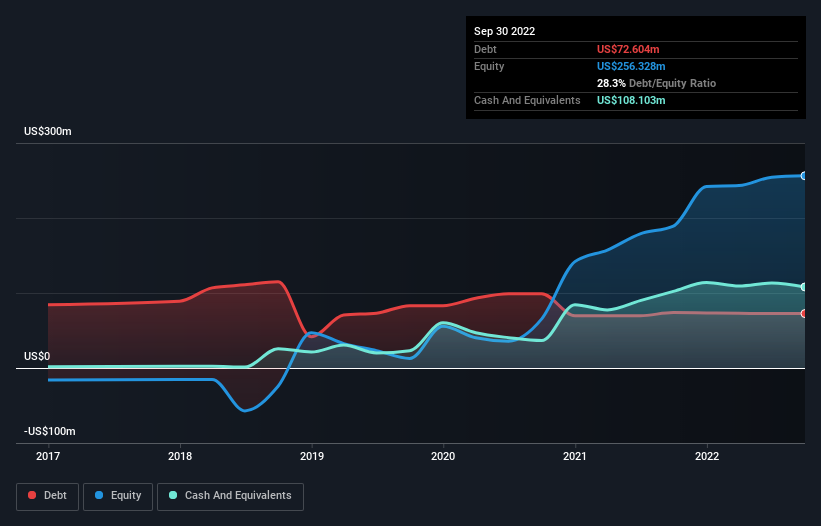- United States
- /
- Biotech
- /
- NasdaqCM:ORGO
Does Organogenesis Holdings (NASDAQ:ORGO) Have A Healthy Balance Sheet?

David Iben put it well when he said, 'Volatility is not a risk we care about. What we care about is avoiding the permanent loss of capital.' So it seems the smart money knows that debt - which is usually involved in bankruptcies - is a very important factor, when you assess how risky a company is. As with many other companies Organogenesis Holdings Inc. (NASDAQ:ORGO) makes use of debt. But should shareholders be worried about its use of debt?
When Is Debt Dangerous?
Generally speaking, debt only becomes a real problem when a company can't easily pay it off, either by raising capital or with its own cash flow. In the worst case scenario, a company can go bankrupt if it cannot pay its creditors. However, a more common (but still painful) scenario is that it has to raise new equity capital at a low price, thus permanently diluting shareholders. Having said that, the most common situation is where a company manages its debt reasonably well - and to its own advantage. When we examine debt levels, we first consider both cash and debt levels, together.
View our latest analysis for Organogenesis Holdings
What Is Organogenesis Holdings's Debt?
The chart below, which you can click on for greater detail, shows that Organogenesis Holdings had US$72.6m in debt in September 2022; about the same as the year before. But it also has US$108.1m in cash to offset that, meaning it has US$35.5m net cash.

How Strong Is Organogenesis Holdings' Balance Sheet?
The latest balance sheet data shows that Organogenesis Holdings had liabilities of US$89.3m due within a year, and liabilities of US$111.7m falling due after that. Offsetting these obligations, it had cash of US$108.1m as well as receivables valued at US$93.1m due within 12 months. So these liquid assets roughly match the total liabilities.
Having regard to Organogenesis Holdings' size, it seems that its liquid assets are well balanced with its total liabilities. So it's very unlikely that the US$335.1m company is short on cash, but still worth keeping an eye on the balance sheet. Simply put, the fact that Organogenesis Holdings has more cash than debt is arguably a good indication that it can manage its debt safely.
It is just as well that Organogenesis Holdings's load is not too heavy, because its EBIT was down 43% over the last year. Falling earnings (if the trend continues) could eventually make even modest debt quite risky. There's no doubt that we learn most about debt from the balance sheet. But it is future earnings, more than anything, that will determine Organogenesis Holdings's ability to maintain a healthy balance sheet going forward. So if you want to see what the professionals think, you might find this free report on analyst profit forecasts to be interesting.
Finally, while the tax-man may adore accounting profits, lenders only accept cold hard cash. While Organogenesis Holdings has net cash on its balance sheet, it's still worth taking a look at its ability to convert earnings before interest and tax (EBIT) to free cash flow, to help us understand how quickly it is building (or eroding) that cash balance. In the last three years, Organogenesis Holdings created free cash flow amounting to 2.1% of its EBIT, an uninspiring performance. That limp level of cash conversion undermines its ability to manage and pay down debt.
Summing Up
While we empathize with investors who find debt concerning, you should keep in mind that Organogenesis Holdings has net cash of US$35.5m, as well as more liquid assets than liabilities. So we don't have any problem with Organogenesis Holdings's use of debt. When analysing debt levels, the balance sheet is the obvious place to start. However, not all investment risk resides within the balance sheet - far from it. For example, we've discovered 1 warning sign for Organogenesis Holdings that you should be aware of before investing here.
Of course, if you're the type of investor who prefers buying stocks without the burden of debt, then don't hesitate to discover our exclusive list of net cash growth stocks, today.
If you're looking to trade Organogenesis Holdings, open an account with the lowest-cost platform trusted by professionals, Interactive Brokers.
With clients in over 200 countries and territories, and access to 160 markets, IBKR lets you trade stocks, options, futures, forex, bonds and funds from a single integrated account.
Enjoy no hidden fees, no account minimums, and FX conversion rates as low as 0.03%, far better than what most brokers offer.
Sponsored ContentNew: AI Stock Screener & Alerts
Our new AI Stock Screener scans the market every day to uncover opportunities.
• Dividend Powerhouses (3%+ Yield)
• Undervalued Small Caps with Insider Buying
• High growth Tech and AI Companies
Or build your own from over 50 metrics.
Have feedback on this article? Concerned about the content? Get in touch with us directly. Alternatively, email editorial-team (at) simplywallst.com.
This article by Simply Wall St is general in nature. We provide commentary based on historical data and analyst forecasts only using an unbiased methodology and our articles are not intended to be financial advice. It does not constitute a recommendation to buy or sell any stock, and does not take account of your objectives, or your financial situation. We aim to bring you long-term focused analysis driven by fundamental data. Note that our analysis may not factor in the latest price-sensitive company announcements or qualitative material. Simply Wall St has no position in any stocks mentioned.
About NasdaqCM:ORGO
Organogenesis Holdings
A regenerative medicine company, develops, manufactures, and commercializes products for the advanced wound care, and surgical and sports medicine markets in the United States.
Flawless balance sheet and good value.
Similar Companies
Market Insights
Community Narratives


